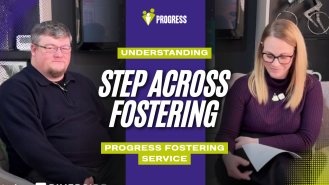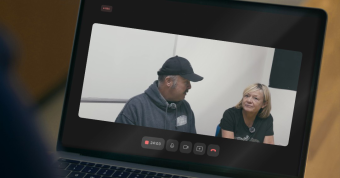Becoming a
Foster Carer

Interested in becoming a foster carer?


How to Start Your Journey
One of the most rewarding things you can make in life is a difference. As a Foster Carer with Progress, you’ll be doing that every day. You don’t need any particular qualifications or experience to apply. The most important things you can possess are patience and the desire to change a young person’s life for the better.
If you have those, becoming a Foster Carer isn’t as complicated as you might think. We’ve broken the process down into six simple steps.
The 6 steps to becoming a foster carer

STEP 01
Enquiry & Visit Request
Use our enquiry form to contact us. Once we’ve received your enquiry we’ll send you an information pack, and a member of the Progress team will contact you to discuss the process.
STEP 02
Initial Visit
This can be in person or virtual, we want to make this as easy as possible for you. The purpose of the initial visit is to learn more about you, your family and your home. It’s also an opportunity for you to ask us questions in person. If you’re happy to proceed, we’ll complete the paperwork required to get the process started. If you need support we can assist, with someone ready to help you to complete the application form.
STEP 03
Skills to Foster & Form F
You’ll be invited to attend a mandatory Skills to Foster training course that provides important information and will give you an insight into what to expect as a foster carer. Once you’ve successfully completed the course, you’ll be allocated a Social Worker who will begin your Form F Assessment. This is an in-depth information-gathering process that will be submitted to an independent Fostering Panel.
During your assessment there will be an opportunity to gain experience of working with children. This will give you a realistic overview of what it is like to be a foster carer. We will provide you with a supportive forum where you will have the opportunity to meet other applicants in assessment, share your experiences, gain confidence and also meet some of our existing carers. Our desire is to offer you a realistic view of fostering and connection with the Progress Fostering team from the very start of your journey.
STEP 04
Fostering Panel
Along with your Social Worker, you’ll be invited to attend the Fostering Panel, who will assess your suitability and make a recommendation of your approval.
STEP 05
Progress Induction
Once approved by the panel, you’ll be allocated a Supervising Social Worker. You will then undertake an induction to provide you with the resources available to begin your role as a Foster Carer with Progress.
STEP 06
Preparing For Your First Foster Child
Progress will notify all the Local Authorities in your area that you have been approved as a foster carer and are available to offer a home to a child. We’ll then work closely with you to match you to and plan for your first placement.
Progress will provide you with a professional career path with full training and support to build your Fostering skills and continue your development in a range of areas.
“It’s been brilliant, you don’t realise that they are ticking things off as you go along”
Trina – Foster Carer

Fostering FAQ's
If you’re thinking about becoming a Foster Carer, you’re likely to have lots of questions. To help, we’ve put together answers to our most frequently asked questions on our dedicated Fostering FAQs page.















